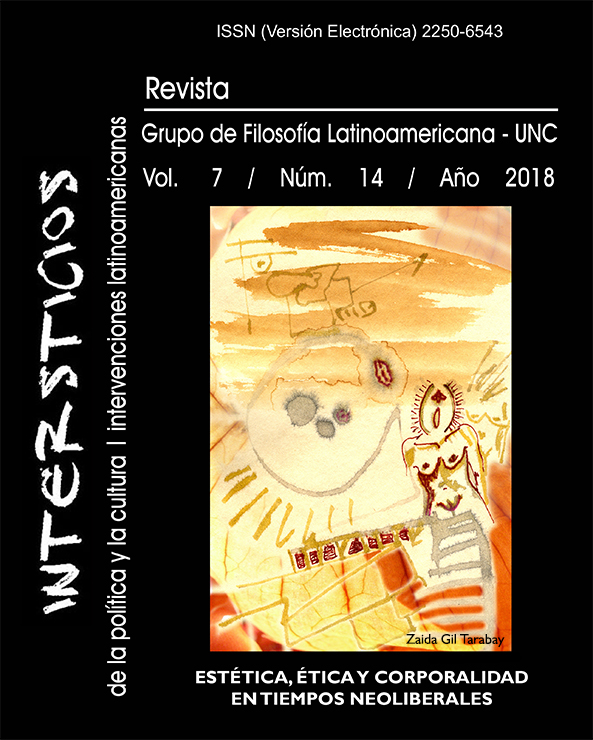Lives that deserve to be cried. A philosophical reading of "Inakayal" by Adrián Moyano
Keywords:
grief, genocide, performativity, political community, interculturality.Abstract
The purpose of this article is to share the thoughts which came from the presentation and reading of Adrian Moyano’s book titled A In plead to my superior chief (A ruego de mi superior cacique, Antonio Modesto Inakayal) articulated with some categories from Judith Butler’s performative theory of genderized subject. This analysis’ main thesis is that both creating an idea of mourning as a process and the sharing of the tears of a life that deserve to be cried, become a political resource, in that they construct identifications and community. In the book, corpus of the present analysis, the author puts into words the experience of Longko Inakayal, recovering voices and sources that have been silenced and hidden for reasons of the dominant powers, thus showing the space of historical silence. It dismantles the colonial narrative which still circulates in schools and in the common sense of our society, opening our thought to other possible ways of living and practicing politics. It questions the authority of the imposed official maps, creating a new cartography which gives room to a territory of social practices which we could call intercultural. It offers an embodied narrative which explains the loss of a way of life caused by the genocide perpetrated against the Mapuche People, and the situations of violence and extermination of the past which explain situations of racism and discrimination in the present time. Mourning, as the public process of the elaboration of loss, requires to grow socially, in that, following Butler’s line of thought, without the recognition of the lives which deserved to be cried there will be no conditions that will allow us to society to know more of who we are and how we change with respect to our grief.Downloads
References
Bengoa, J. (2007). Historia de los antiguos mapuches del sur. Desde la llegada de los españoles hasta las pases de Quilín. Siglos XVI y XVII. Santiago de Chile: Catalonia.
Butler, J. (2001). Mecanismos psíquicos del poder. Teorías sobre la sujeción, Madrid, España: Cátedra.
Butler, J. (2006). Vida precaria. El poder del duelo y la violencia. Buenos Aires, Argentina: Paidós.
Butler, J. (2008). Cuerpos que importan. Sobre los límites materiales y discursivos del “sexo”. Buenos Aires, Argentina: Paidós.
Butler, J. (2010). Marcos de guerra. Las vidas lloradas. Buenos Aires, Argentina: Paidós.
Delrio, W., Lenton, D., Musante, M., Nagy, M., Papazian, A. & Pérez, P. (2010). Del silencio al ruido en la Historia. Prácticas genocidas y Pueblos Originarios en Argentina. En el III Seminario Internacional de Políticas de la Memoria, Centro Cultural de la Memoria Haroldo Conti, Buenos Aires, Argentina.
Moyano, A. (2010). Crónicas de la resistencia Mapuche. Bariloche, Argentina: Edición del Autor.
Moyano, A. (2013). Komütuam. Descolonizar la Historia Mapuche en Patagonia. Bariloche, Argentina: Alum Mapu Ediciones.
Moyano, A. (2017). A ruego de mi superior cacique, Antonio Modesto Inakayal. Viedma, Argentina: Fondo Editorial Rionegrino.
Pepe, F., Añon Suárez, M. & Harrison, P. (2008). Identificación y restitución: colecciones de restos humanos en el Museo de La Plata. La Plata, Argentina: Edición del Autor.
Segato, R. (2007). La Nación y sus Otros. Raza, etnicidad y diversidad religiosa en tiempos de Políticas de la Identidad. Buenos Aires, Argentina: Prometeo.
Segato, R. (2007). Identidades políticas/Alteridades histórica: una crítica a las certezas del pluralismo global. En La Nación y sus Otros. Raza, etnicidad y diversidad religiosa en tiempos de Políticas de la Identidad (pp. 37-69). Buenos Aires, Argentina: Prometeo.
Sosa, C. (2012), “Queremos mamá y papá”. Duelo y filiación en la Argentina contemporánea. Revista de la Facultad de Ciencias Sociales/UBA. Recuperado de: http://www.sociales.uba.ar/wp-content/uploads/SOCIALES-81-interior-revista.pdf.
Quintana, M. (2017). Reseña de Queering Acts of Mourning in the Aftermath of Argentina’s Dictatorship. The Performances of Blood (Cecilia Sosa, Tamesis Books, Londres, 2014, pp. 284). Revista Mora, 23 (en prensa).
Quintana, M. (2015). Sujeciones discursivas/desplazamientos retóricos: emergencia (y agencia) de Abuelas de Plaza de Mayo entre el parentesco y el Estado. Nomadías, (19). doi:10.5354/0719-0905.2015.36761.
Ordenanza Municipal N°2641-CM-15. Acta N°1038/15. Consejo Deliberante de San Carlos de Bariloche, Provincia de Río Negro, Argentina, 18 de junio de 2015.
Downloads
Published
Issue
Section
License
Authors who have publications with this journal agree to the following terms:
a. Authors will retain their copyright and grant the journal the right of first publication of their work, which will simultaneously be subject to the Creative Commons Attribution License that allows third parties to share the work as long as its author and first publication in this journal are indicated.
b. Authors may adopt other non-exclusive license agreements for distribution of the published version of the work (e.g., deposit it in an institutional telematic archive or publish it in a monographic volume) as long as the initial publication in this journal is indicated.
c. Authors are allowed and encouraged to disseminate their work through the Internet (e.g., in institutional telematic archives or on their web page) after the publication process, which may produce interesting exchanges and increase citations of the published work (see The effect of open access).


